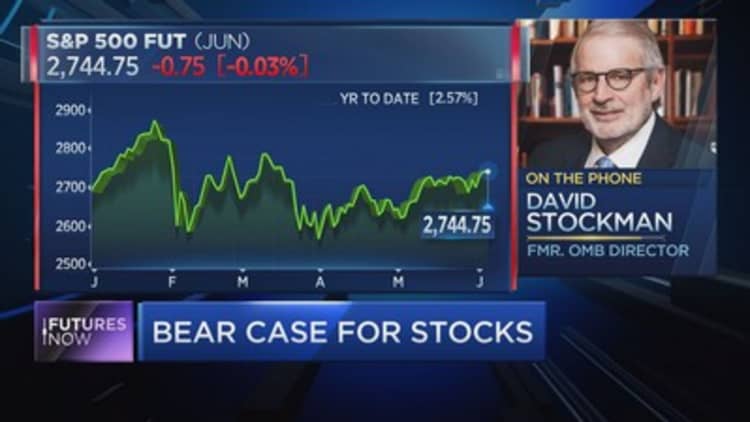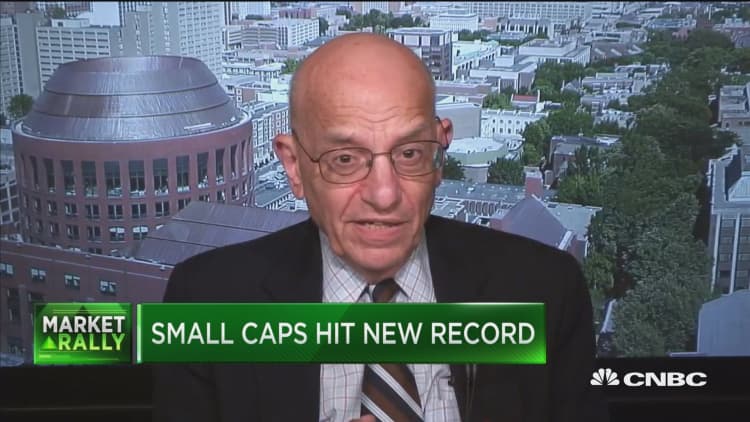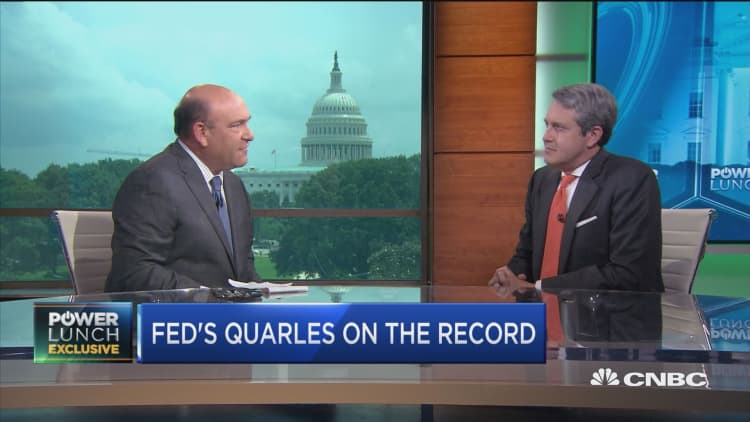Emerging markets were rattled Thursday as a range of fears rippled through financial markets — ranging from U.S. trade wars to Federal Reserve interest-rate hikes.
Brazil was the meltdown du jour, but the European Central Bank was also a major factor, with fears it would move to end its bond buying or quantitative easing, sending the euro higher. Italian bond yields reversed and moved higher amid chatter the ECB could decide at its meeting next week to curb easing at a time when its weakest links, such as Italy, need help.
A nervousness spurred in part by higher rates has rolled through emerging markets, such as Turkey and Argentina. Now Brazil was the latest to see capital flight, a floundering currency and stock market sell-off. Its stock market was down more than 7 percent at the low point Thursday, before cutting losses in half, and its currency fell as much as 3 percent against the dollar, as fears circulated about its fiscal outlook amid political uncertainty.
"I think everything started in mid-April, with the IMF meeting. Everyone went there with one theme in mind — synchronized global growth which would work with rising rates in the U.S.," said Claudio Irigoyen, head of Bank of America Merrill Lynch Latin America economics and fixed income strategy.

But Irigoyen said growth has turned out to be questionable in Europe and China and that has made markets nervous. "Everyone was on the wrong side of the trade. The trade was crowded. Then they started to unwind risk in EM. As they say, when the tide goes out you know who was swimming naked, and the guys swimming naked were Argentina and Turkey."
But he said now Brazil is joining in, and Mexico is on the edge, affected by the fact the North American Free Trade Agreement is not likely to be renegotiated for longer than expected, and it may be decided by a new leftist government. The Mexican peso lost another percent Thursday. The EM sell-off was widespread, with the South African rand down about 2.5 percent against the dollar.
Irigoyen said adding to uncertainty in emerging markets are the trade strategies of the Trump administration, which if they bring about trade wars could lead to slower global growth.
Alejo Czerwonko, an emerging market strategist at UBS Global Wealth Management's Chief Investment Office, said Brazil's problems are coming from a combination of global central bank tightening and domestic issues ahead of its October election.
In the last four weeks, there's been "a worsening of the social and political dynamics that forced most analysts and investors to reassess their growth outlook, and importantly their electoral outlook. We think recent developments push downward the probability of a centrist candidate, and that pushes upward the probability of a candidate on either the extreme left or extreme right," he said. The recent trucker strike over high diesel costs exacerbated the situation.
IShares MSCI Brazil ETF was down 5.1 percent Thursday. The EEM, the iShares MSCI Emerging Markets ETF, fell 1.5 percent Thursday.
The worries also added to a weakening in U.S. stocks, which closed mixed. The was off 1 point to 2,770, and the Dow was up 95 at 25,241. Treasury yields fell after the 10-year peaked at 2.99 percent early in the day. In late trading, it was at 2.92 percent.
"When the Fed gets deeper into a tightening cycle, it exposes vulnerabilities that were there to begin with, but people become less tolerant," said Peter Boockvar, chief investment officer with Bleakley Financial Group. Both the Fed and ECB meet next week.
"The ECB ending [quantitative easing] on top of the interest rate pickup in the U.S. is a tough combination to maneuver," he said, adding the Fed also is reducing its balance sheet at the same time.
"That's a double tightening. Two weeks after the Fed meeting next week, it's going to be reducing its balance sheet by $120 billion a quarter from $90 billion a quarter, so tightening is taking two forms here," Boockvar said. "A lot of these overseas companies and countries have debt in dollars, and if there's a rally in the dollar, this dollar-denominated debt costs more to carry."

Larry McDonald, head of U.S. macro strategies at ACG Analytics, said he believes the Fed is a big factor in the woes of the emerging markets. "It started with the offshore dollar crisis. There's a shortage of dollars globally in the world. When the dollar moves higher, that makes the shortage more extreme," he said.
McDonald said part of the problem is that the Fed misjudged its program to reduce its balance sheet, and he expects it may make some comment on it after its meeting next week.
"I think they're going to be embarrassed. They're going to have to walk this balance-sheet reduction back," he said.
"They've been called out this week by central banks from emerging markets, to the point where you had an op-ed in the Financial Times from the governor of the central bank of India," he said.
Urjit Patel wrote in the Financial Times that dollar funding of emerging market economies has been in turmoil for months. "The upheaval stems from the coincidence of two significant events: the Fed's long-awaited moves to trim its balance sheet and a substantial increase in issuing US Treasuries to pay for tax cuts," he wrote.
He also noted that if the Fed does not slow down its balance-sheet program, "Treasuries will absorb such a large share of dollar liquidity that a crisis in the rest of the dollar bond markets is inevitable."
McDonald said the issue is the unintended consequence of tax cuts and of the Fed's balance-sheet action. The Treasury has increased its issuance to pay for the tax cuts. McDonald said also speculators have been targeting vulnerable markets.
The selling in emerging markets could continue. "Their debt is tied to dollars, and they need to fund themselves. Each one is having to raise interest rates in order to defend their currencies," said Andrew Brenner of National Alliance. "It gets worse and worse, and feeds on itself, and then all of a sudden you have systemic risk."
WATCH: Fed's Quarles on Trump's tariffs, interest rates



